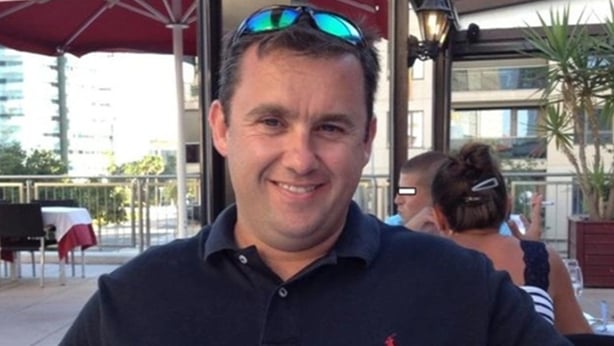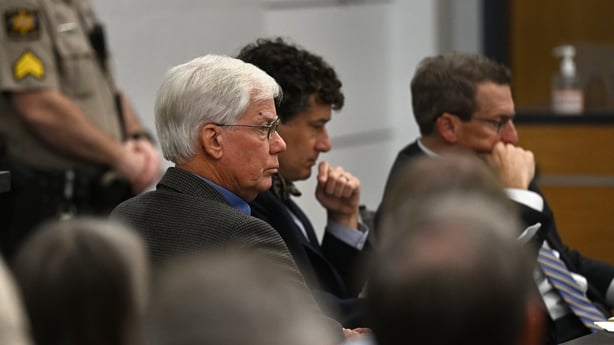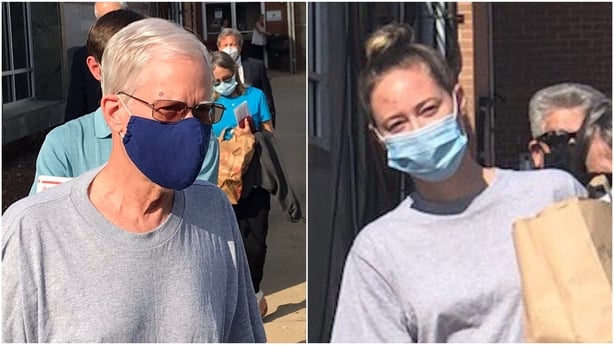Molly Martens Corbett and her father Tom Martens have been sent back to prison by a judge in North Carolina for the manslaughter of Limerick man Jason Corbett.
Judge David Hall sentenced both defendants to prison time of 51 to 74 months.
Taking into account time already served of 44 months, they will serve extra time of between seven and 30 months (two-and-a-half years).
Mr Corbett, 39, was beaten to death at his home in North Carolina in August 2015.

Both defendants were placed in handcuffs and were led away on the announcement of the sentences, first Martens Corbett and then her father.
Judge Hall ordered that Martens Corbett undergo a psychiatric assessment by a medical doctor and be afforded all the psychiatric and psychological care available in the prison system. He further ordered that she be placed on suicide-risk watch.
Judge Hall said he accepted a number of mitigating factors in formulating his sentence for both defendants.
However, he did not find exceptional mitigation, which would have allowed him to impose the probation act.
Judge Hall also ruled that he did not find the presence beyond a reasonable doubt of an aggravating factor in the case, namely that the children could have seen and heard the crime being committed.
Accordingly, he could not give a sentence in the six to nine-year range prosecutors had sought.
On leaving the courthouse, defence lawyer for Martens, Jones Byrd, said that the sentence imposed was "more than just", and that he was disappointed further time in custody had been ordered.
His colleague Jay Vannoy, also acting for Mr Martens, said he expected his client to be released in seven months' time.
Mr Corbett’s two children addressed the court, reading lengthy victim impact statements. Both denounced Martens Corbett as a "monster" who taught them to lie about their father.

They said their words as children were weaponised against them to help their father’s killers walk free. They appealed to the judge to impose the maximum sentences available.
Martens Corbett sobbed loudly as Sarah Corbett spoke of how Martens Corbett had stolen her childhood and her father.
At one point, she laid her head on the courtroom table and cried. She used a large box of tissues on the table to wipe her tears.
Other friends and relatives of the Martens, who were present in court, were heard crying during the impact statements and the sentencing.
Jack Corbett opened his statement by telling the judge he was a liar. He said Martens Corbett taught him to lie to cover up her crime of killing his father.
Earlier, Martens Corbett and Martens made their own brief addresses to the court before sentence was pronounced.
Martens Corbett said that not a single day goes by without her regretting her actions on the night of 2 August 2015 and the impact that has had on so many lives.
Martens said: "I accept responsibility for what I did. I am sorry."
Read more:
Martens sentencing ends eight years of legal process
Key points in the Martens Corbett case
Originally sentenced to 20 and 25 years respectively for murder and involuntary manslaughter, the pair never denied killing Mr Corbett, but insisted they had acted in self-defence.
In 2020, an appeal court quashed the convictions and ordered a retrial, stating that some evidence that had been excluded from the original trial should have been presented to the jury.
That decision was upheld by the North Carolina Supreme Court in 2021.
Last week, they both entered guilty pleas to manslaughter charges, in return for the district attorney dropping murder charges.
Earlier, in closing arguments the prosecution argued an aggravating factor existed, namely the presence of the two Corbett children in the house at the time.
It said this justifies an additional custodial sentence for the two defendants.
Defence lawyers had argued extraordinary mitigating factors exist that should lead the judge not to impose custodial sentences.
Prosecuting counsel, Assistant District Attorney Alan Martin, opened his address by saying "Molly was all about the kids".
He said that lawyers can often get caught up in the minute detail of a case, but the big picture was that Martens Corbett "wanted to get custody of the kids – and they were not her kids".
He said Martens Corbett, realising that the clock was running out on her time to get custody of the children, manufactured a situation in which she would have witnesses in the house to an episode of domestic violence, which would lead to a court awarding her custody of the children.

Those witnesses were to be Martens and his wife Sharon. But he said the situation developed far beyond that and led to the killing of Mr Corbett.
In seeking to demonstrate the existence beyond a reasonable doubt that an aggravating factor existed at the time of the killing that would justify prison terms at the upper end of the sentencing range of six to nine years, Mr Martin said "it was nothing but a miracle that these two children do not have these events scarred into their consciousness", as they were asleep in their bedrooms at the time.
He said it was on the basis of this miracle that the defendants were trying to argue an aggravating factor, the presence of persons under the age of 18 at the crime scene, did not exist.
Mr Martin focused on the motivation of Martins Corbett in the case, saying she had a plan, well before her marriage to Mr Corbett, to enter into a loveless marriage with the sole intention of getting custody of someone else's children.
He said: "They were not her children, they are not her children, they never will be her children."
Mr Martin accused Martens Corbett of "deceiving and dissembling" in her interactions with other witnesses in the case, saying her statements were "as real as her dead sister or the stretch marks from giving birth to Sarah".
He said her defence strategy was to say all along that everything that happened before 2 August 2015 was Mr Corbett's fault, and everything that happened after he died was her father's fault.
Mr Martin drew attention to the fact that no evidence was presented about the time of death of Mr Corbett.
He claimed there had to have been a period of time between the end of the assault and the call by Martens to emergency services, as Martens was not out of breath and was giving clear, calm instructions.
This, he said, was at variance with the medical evidence presented by Dr George Corvin about the "brain hijack" in an extreme "fight, flight or freeze" situation.
He said Mr Corbett has no voice in the trial, but the forensic evidence from the crime scene spoke for him and said that his head was "obliterated" by an assault with blunt instruments and this went far in excess of what was necessary for self-defence.
Defence appealed against custodial sentence
Defence counsels Jay Vannoy and Jones Byrd for Martens said he admits killing Mr Corbett and takes responsibility for his crime.
They said there was extreme mitigating factors, notably the sight of Martens' daughter being strangled by her husband.
This triggered a law-abiding law enforcement officer into an uncontrolled assault.
Mr Byrd said this was one of the "rare cases, rare cases, where our law provides for exceptional mitigation".
He argued that it would be wrong to send Martens back to prison for any more time, as he has already served 44 months.
Earlier, the court had heard expert witness opinion from Dr Corvin, a forensic psychiatrist called by the defence.
He testified about an interview he conducted with Martens earlier this year while compiling a report on the state of Martens' mind when he killed Mr Corbett.
Dr Corvin described Martens as a "Type A personality," someone who was most comfortable with order and structure, who followed rules and obeyed laws.
He said his personality type ideally fitted him for his work in the FBI, and later in counterintelligence at a government nuclear laboratory in Tennessee.
In both jobs, Martens held Q clearance, a top-level security clearance permitting him to view top secret government documents, something he had to be tested for frequently.

Dr Corvin said this personality type would be particularly prone to the "coded evolutionary instinct to act without thinking" if confronted with a scene of extreme danger, like that which he witnessed when he walked into the master bedroom suite and saw Mr Corbett strangling his daughter.
He explained that in such a sudden life-threatening situation, the human brain is programmed by evolution to abandon cognitive thought to act immediately for self-protection.
Dr Corvin described the process as an "amygdala hijack", when higher brain function is switched off temporarily to speed up reaction time to a life-threatening event.
This, he said, explained why Martens could not remember how many times he hit Mr Corbett with a baseball bat, nor did he remember seeing his daughter hit Mr Corbett with a paving brick.
It was only after the immediate danger was passed that Martens recovered enough control over himself to call the emergency services.
Describing his two hour and 40 minute-long interview in January, Dr Corvin said Martens "was polite, thoroughly methodical, and a typical Type A personality. He lived a life in which order is important and organisation is important".
"He is deliberate and analytical," Dr Corvin said.
He said Tom Martens would be inclined to use logic over emotion, to follow rules rigidly. He was a pro-social man driven to find solutions and help other people, Dr Corvin said.
"I don't want to say that he is devoid of emotion, but he likes to deal with situations that are just the facts," Dr Corvin said.
"He was not very emotive," he added.
He said Martens went into the master bedroom to diffuse a row between but instead it escalated.

Dr Corvin said Martens tried to use his Type A personality skills to de-escalate the situation, but instead Mr Corbett began choking Martens Corbett and a "fight or flight" response kicked in.
This was the body's "emergency overdrive" for when your life was in imminent danger, Dr Corvin said.
Judge Hall intervened and questioned Dr Corvin directly, noting that in the four different versions of the incident Martens had given to Davidson County Sheriff's office, the Department of Energy, the original murder trial in 2017 and Dr Corvin's interview, there were some discrepancies.
The most notable one, which Judge Hall said he was "wrestling with," was in the Department of Energy interview, in which Martens described hearing a row upstairs, saying he knew Mr Corbett was abusive towards his daughter, feared he may have been using violence against her, knew he (Jason) had been drinking, and decided to go upstairs with a baseball bat to put a stop to the abuse.
Judge Hall said that as well as entering the room and seeing a shocking scene that triggered an "amygdala hijack", it was just as plausible that he went straight into the room, and on seeing Mr Corbett with his hands on Martens Corbett’s neck, proceeded to "beat the devil out of the guy".
Dr Corvin agreed the scenario was plausible but said the life-or-death picture of his daughter being attacked, or the later loss of the baseball bat to Mr Corbett and his fears for his own life could have been triggers for an 'amygdala hijack', an extreme version of the "freeze, fight or flight" response.





